Report on Sustainable Development
GOAL 5

GENDER EQUALITY
Achieve gender equality and empower all women and girls
1

“Gender equality is the goal that will help abolish poverty and create more equal economies, fairer societies, and happier men, women, and children.”
– Graça Machel
Sustainable Development Goal 5 has nine targets and 14 indicators and clearly emphasizes ending discrimination, violence, and exploitation against all women.
In a an interview with Prof. Ananya Mukherjee, Vice Chancellor, Shiv Nadar University remarked that the agenda of Shiv Nadar University is to transform the very ways in which we learn, discover, teach, analyze, act, live, and come together to create an institution of higher learning. ‘Needless to say, women are, as they must be, central to such an agenda.’
Over the years, at Shiv Nadar, we have built a tradition of understanding, respecting, embracing, and celebrating gender through our teaching, research, institutional practices, and partnerships. Here is a glimpse of some of our work.
1 Teaching and Learning
At the School of Humanities and Social Sciences, many departments offer courses for undergraduate and graduate students, such as
Introduction to Gender Studies (ENG 304), Gender Studies (ENG 612), Studying Culture, Caste and Gender (SOC 216), Introduction to Gender Systems (SOC 292), Gender in International Relations: Power, Sexuality and Violence (INT 142), Engendering History (HIS 216), Gender and International Relations (INT 266), Contextualizing Gender (SWC 309).
For undergraduate students, many compulsory courses are regularly offered, such as Gender Violence and Social Marketing for Social Change (CCC 215), Environmental Studies (CCC 704), Environmental Impact Assessment (CCC 406), Energy for Sustainable Future (CCC 614), Use of Energy in our Daily Life (CCC 624), to name a few.
We have subscribed to a course titled “Consent Matters” offered by Oxford University Press.
Consent Matters is a course that all our students and the majority of our faculty and staff have undertaken. In order to make our students aware of the rights, entitlements, and responsibilities enshrined in the sexual harassment at workplace (Prevention,
Prohibition & Redressal) Act 2013 and under the UGC regulations, 2015, we decided to move beyond the lecture mode and converted this to experiential learning through taking this online course across the University and participating in immersive workshops. Conducted by a team of faculty, staff, and students, the workshops bring together fictional skits to tackle real-life issues for students that, in turn, bring home understanding, inclusivity, and sensitivity to the issues.

Sensitization Session
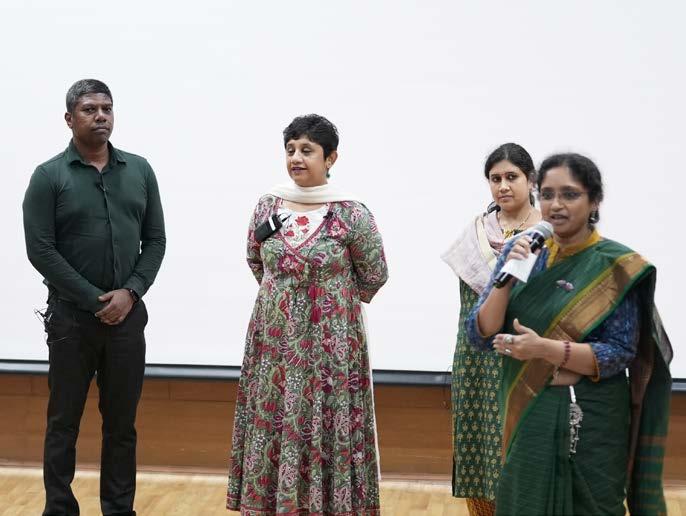
2
Student Projects
Design and development of a safety device for women in the Indian transport service system
This project is one of the opportunities for Undergraduate Research (OUR) that many of our undergraduate students take up.
Nitya Mathur (Design Minor 20192023), under Dr. Subhajit Chandra, Assistant Professor, Department of Design, researched on women from low socio-economic backgrounds in India who have limited job prospects. Occupational segregation based on gender has been attached to job roles, which has been the principal reason for women with traditional jobs as domestic workers and caregivers.
While things are changing in metropolitan cities like Delhi, Bangalore, Mumbai, and Kolkata, this study in particular addresses the issue of an increase in incidents of crime as women venture out for professions like driving public transport. The project examines the various safety measures in place and analyses their effectiveness. A safety device has been proposed to ensure women’s safety on Indian roads. The project is OUR funded.
Microfinance programs among women
Mann Gupta, a student of B.Sc. Mathematics (Research) under the supervision of Dr. Charu Sharma, Assistant Professor, Department of Mathematics, carried out this work

to study the depth of outreach of microfinance programs among the women in Dadri and Ghaziabad. Based on in-depth questionnaires, surveys, and analysis among 50 women, the study ascertained that microfinance has helped in the financial inclusion of poor women, but the role of microfinance as an empowerment tool is not as concrete and humongous.
2 Research
Don’t cross the line: Bounding the causal effect of hypergamy violation on domestic violence in India
Punarjit Roychowdhury, Assistant Professor, Department of Economics, in his research, examines whether a violation of hypergamy—which occurs when the wife’s economic status equals or exceeds that of her husband’s—causally affects domestic

Nitya Mathur (Design minor, 2019-2023)
violence using microdata from India. The study uses a non-parametric bounds approach and finds strong evidence that violation of hypergamy leads to a significant increase in domestic violence. There is suggestive evidence that this result arises because violation of hypergamy is likely to undermine patriarchal beliefs and norms about gender roles, and it is likely to increase men’s likelihood of using domestic violence as an instrument to sabotage their wives’ labor market prospects. The findings suggest that policies that seek to empower women and promote gender equality might paradoxically increase women’s exposure to domestic violence. © 2022 Royal Statistical Society.
Roychowdhury, Punarjit, and Gaurav Dhamija. “Don’t cross the line: Bounding the causal effect of hypergamy violation on domestic violence in India.” Journal of the Royal Statistical Society Series A: Statistics in Society 185, no. 4 (2022): 19521978.
Gender Relations - Cognition of sexual harassment and
the role of policy
Four faculty from across the Departments won one of the faculty grants for Interdisciplinary Research (FGIR) award from Shiv Nadar Institution of Eminence. Debarati Basu, Associate Professor; Paromita Goswami, Professor, School of Management and
3
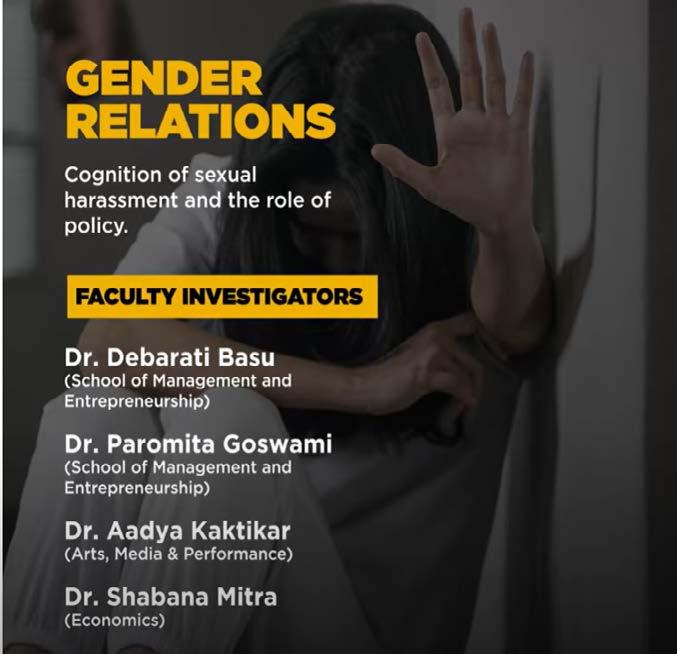
Entrepreneurship; Shabana Mitra, Associate Professor; and Aadya Kaktikar, Professor, School of Humanities and Social Sciences. Faculty Grant for Interdisciplinary Research (FGIR) at Shiv Nadar invites proposals to celebrate research that is interdisciplinary, creative, and socially impactful. Over 80 proposals were submitted for FGIR 22-23 against the allocated fund of INR I crore in the four thematic areas: Environment, Energy, Data and Computation, and Cognition. The proposals were assessed through two rounds of external evaluations by experts, and six winning teams were awarded.
Indian Women and Mathematics (IWM)
Dr. Amber Habib, Professor, Department of Mathematics, is on the executive committee of Indian Women and Mathematics (IWM). This project began in 2013 and is supported by the National Board of Higher Mathematics (NBHM), Department of Atomic Energy, Government of India, and continues to be sponsored by NBHM. The aim is to encourage more women to pursue higher education and careers in mathematics. Amongst other activities, the IWM organizes regular academic events and networking opportunities across India and collaborates with like-minded organizations and people across the world.
In an article, Dr. Habib and his collaborators elucidate the story of Indian women in mathematics. Agarwal, N., Habib, A., Venkataraman, G. (2022). Indian Women and
Mathematics. In: Beery, J.L., Greenwald, S.J., Kessel, C. (eds) Fifty Years of Women in Mathematics. Association for Women in Mathematics Series, vol 28. Springer. https://doi. org/10.1007/978-3-030-826581_87
Women in Science
Dr Rohini Garg, Department of Life Sciences, has featured in Women in STEM: Vanguards of India @ 75, a compendium to acknowledge the contribution fraternity of women scientists and professionals towards the understanding, development of expertise, and growth of the subjects of Science, Technology, Engineering, and Mathematics. This compendium is a part of many initiatives by the Confederation of Indian Industry (CII) to enable and enhance the participation of women in these areas. The project emphasizes the role of women as potential and equal contributors to the sustainable growth of society.
Dr. Garg has also featured in the Future Hopes section of “Vigyan Vidushi: 75 women trailblazers of Science,” published by Vigyan Prasar, Department of Science and Technology (DST), India. It highlights the areas of 25 Young women scientists from India besides 75 women trailblazers in biotechnology, bioinformatics, artificial intelligence, engineering, mathematics, etc.
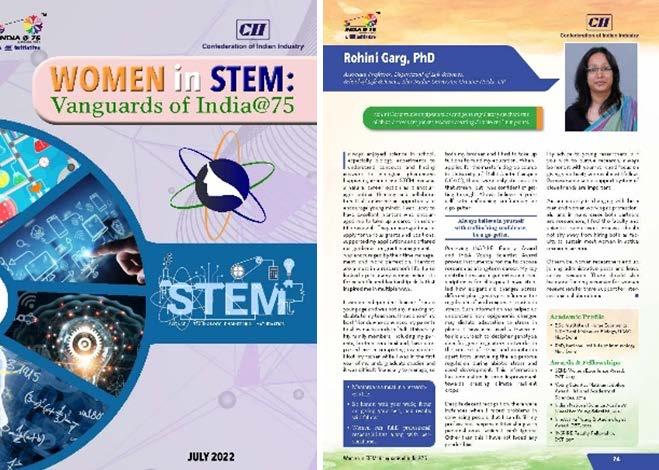

3 University Operations
Zero tolerance policy for gender insensitivity and sexual harassment
Shiv Nadar University is an inclusive workplace that has a zero-tolerance policy for gender insensitivity and sexual harassment. We have an active Internal Complaints Committee (ICC) as per the University Grants Commission (UGC) guidelines prescribed by the law, which investigates complaints regarding sexual harassment within the University (considered as a workplace) and recommends appropriate action. The ICC also undertakes sensitization programs for all incoming students, faculty, and non-teaching staff at the beginning of the annual year. The University also has a full-time Gender Officer who works closely with the ICC.
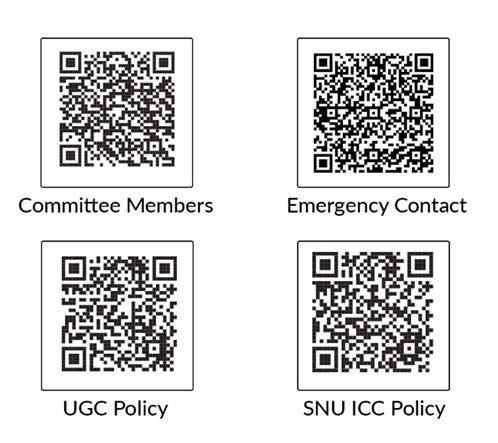
Girl Up student-led club
Girl Up Shiv Nadar University is a chapter of the Girl Up Campaign, a UN Foundation Initiative. The goal is to influence local communities, promoting worldwide tolerance, respect for one another and many more. The club has made significant social contribution to the empowerment of women and children.

4
On Campus
• We provide equal opportunities to all for education and learning.
• All women students, staff and support staff has access to free sanitary pads in the women toilets.
• All women toilets in hostel and academic areas are equipped with hygiene bins.
• To provide quality work life balance to our employees, the University provides a Crèche facility inside the campus to enable working parent(s) to leave their small children under the care of trained staff while they can perform their official duties.
At Shiv Nadar we have the tradition of hosting guests from across the globe for seminars, talks and academic sessions
In its Brown Bag series of luminary talks, the School of Management & Entrepreneurship invited Dr. Emőke-Ágnes Horvát, Assistant Professor of Communication Studies at the Department of the School of Communication, Northwestern University, to deliver a talk titled, Gender Inequalities in the Online Dissemination of Scholars’ Work.
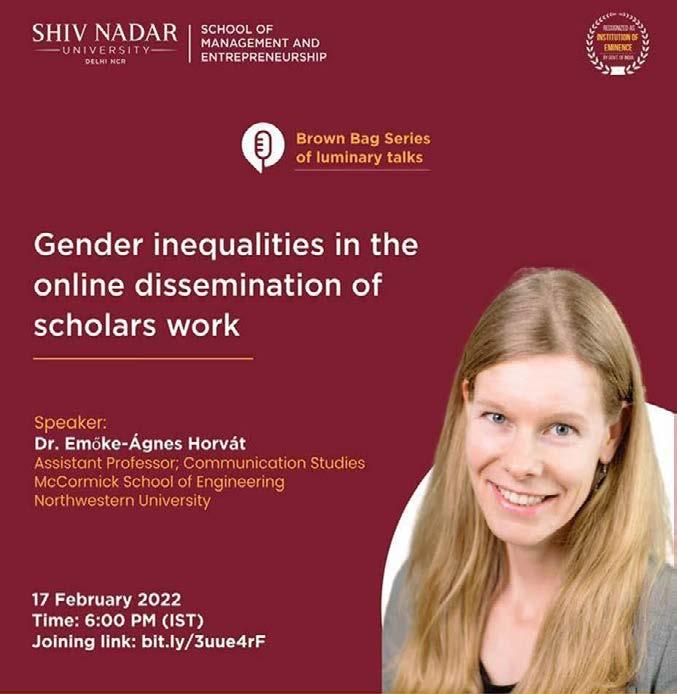
The Department of Economics hosted a session on ‘Who benefits from piped water? Evidence from a gendered analysis in India’ by Mr. Ashish Sedai, Ph.D. candidate at Colorado State University. The session highlighted the disproportionate burden on women of water collection and distribution in the household in developing economies.
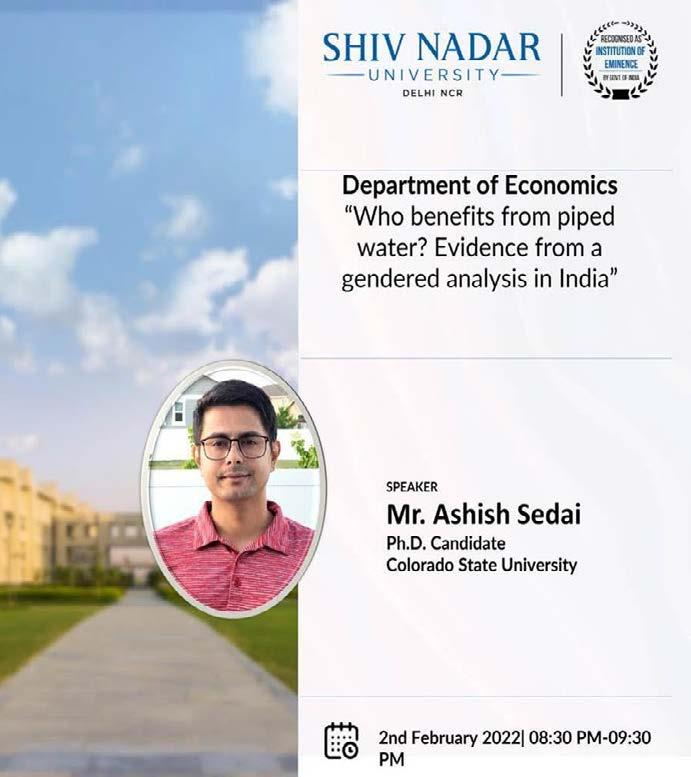
The School of Humanities and Social Science hosted a talk titled ‘Social Networks, Gender Norms and Women’s Labor Supply: Experimental Evidence using a Job Search Platform’ by Dr. Nikita Sangwan, Visiting Assistant Professor, CECFEE, ISI Delhi.
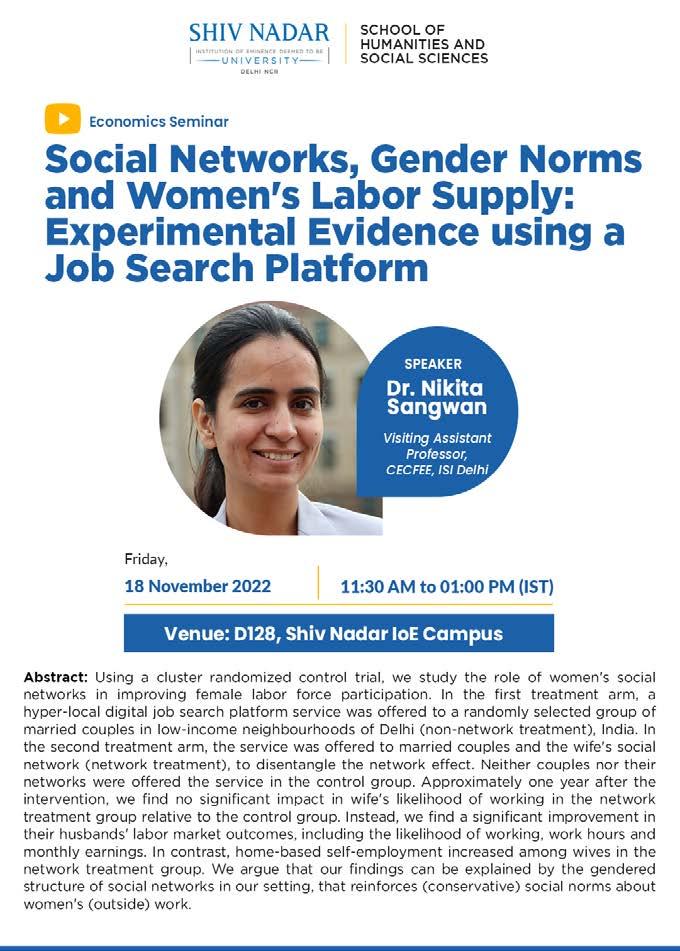
The Department of Economics hosted an interesting seminar on ‘Gender, Marriage, and Portfolio Choice: Role of Income Risk’ by Dr. Pubali Chakraborty, Assistant Professor, Ashoka University. Her seminar discussed the source of gender and marital status differences in portfolio choices across U.S. households. Both the gender wage gap and the higher income risk faced by women play an important role in explaining the differences in risky investments across households.

The Department of Economics hosted Debasmita Das, Ph.D. candidate at Purdue University to deliver a talk on ‘Child-rearing, Social Security and Married Women’s Labor Supply over the Life Cycle’. The talk focused on how career interruptions during child-rearing years affect the labor market trajectory, lifetime earnings, and social security benefits of married women in the United States.
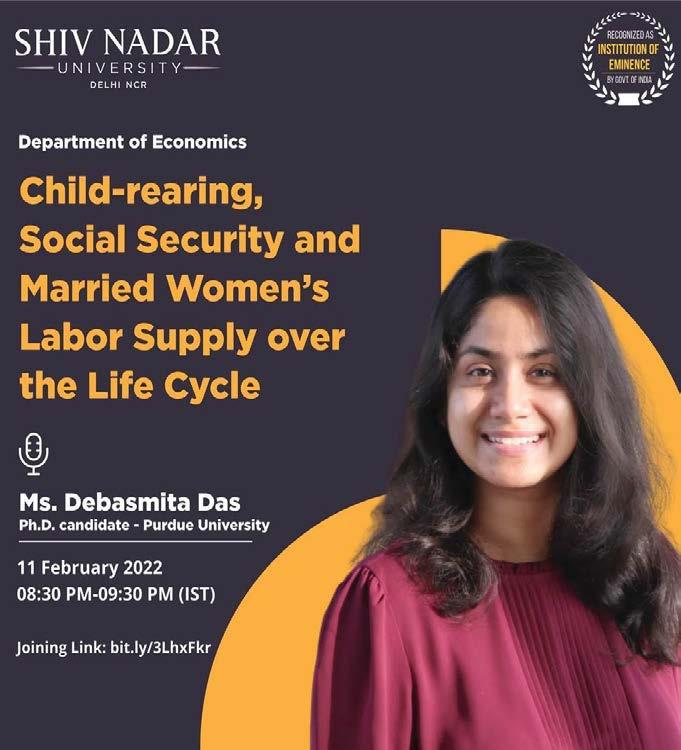
5
4 Partnerships
Research CollaborationEducation, Stigma and Intimate Partner Violence (IPV)
Dr. Shabana Mitra, Associate Professor, Department of Economics in partnership with Manika Bora, faculty at O.P. Jindal and Roopal Jain, student at Shiv Nadar University are working on a project on Education, Stigma and Intimate Partner Violence (IPV). In their research, they highlight that education can influence intimate partner violence through three channels. First, education enables women to feel more empowered and so they are able to raise their voice and take decisive action against IPV, this is deterrent to IPV. The second channel is due to education, there is greater realization of the stigma attached to IPV, resulting in lower reporting of IPV, even if there is no actual reduction in IPV. A third channel is due to education, women feel empowered and hence report more the occurrence of IPV and hence, may see that IPV increases with education. Using a novel dataset from Bihar, Jharkhand, and Uttar Pradesh, three states in the Northern India, it brings forth that women completing secondary education is related to reduce reporting of intimate partner violence while if they are able to make independent decisions and are employed, they report more IPV. This seemingly contradictory finding suggests that education brings more stigma to reporting, and employed (in the farm sector, mostly the uneducated) women feel more empowered to report.
The South Asian partnership development grant
Dr. Sruthi Muraleedharan, Assistant Professor, Department of International Relations and Governance Studies, received the South Asian Development Grant. The grant is used for organising
an international workshop in collaboration with the University of Exeter, June 13-15, 2022, titled, Interrogating the ‘International’ from a Transnational Feminist Lens: A view from SWANA and South Asia at Exeter, United Kingdom. In the three-day workshop, the team worked on issues prioritizing transnational feminist analysis in their approach whilst rethinking the territorial trap that conventional IR and state-centric analysis dictate.
Gender in Higher Education project (2021-23)
Shiv Nadar Institution of Eminence is part of an ongoing project, ‘Gender Equality in Higher Education in India’, led by Savitribhai Phule University Pune and Brunel University London. This two-year research study is supported by the British Council and seeks to inform the National Education Policy (NEP) 2020 in the context of the achievements of higher education in gender equality. The team analyses issues of access, retention, campus climate, employability, leadership, and curricular and institutional practices in India, focusing on gender equality based on research conducted in ten higher educational institutions and across five states

in India selected on the basis of the socio-economic diversity of the regions, gross enrolment ratio and gender parity index. Dr. Sruthi Muraleedharan, Assistant Professor, Department of International Relations and Governance Studies, and Dr. Divya Kannan, Assistant Professor, Department of History and Archaeology, are collaborating from Shiv Nadar.
Start-ups to address sustainability
The University supports start-up ideas through the Atal Incubation Center (AIC) to encourage and create an active entrepreneurship culture. AIC is set up on a 10,000 sq. ft space at the University with the support of the Atal Innovation Mission, NITI Aayog, Government of India. The University and the Government provide 50% of the core funding to a start-up selected through a rigorous process and mentoring through University leadership and professors.
Prodigious Management Consultancy Pvt Ltd. is one example of a start-up which is into manufacturing anti-bacterial sanitary napkins for women & girls in the age group of 15 to 49 years to manage their menstrual hygiene in a more effective and efficient manner rendering a safe infection free & healthy experience. Their USP is ANION chips in the napkins which protects women from all kinds of bacterial & fungal infections leading to cervical cancer.

6
Shiv Nadar Institution of Eminence is fully committed to the UN Sustainable Development Goals (SDGs). We have embraced a four-pronged strategy for SDGs through teaching, research, our core institutional practices, and partnerships.
Deepa Hazrati Manager, Office of the Vice-Chancellor deepa.hazrati@snu.edu.in
 Shiv Nadar Institution of Eminence Gautam Buddha Nagar, Uttar Pradesh, India
Shiv Nadar Institution of Eminence Gautam Buddha Nagar, Uttar Pradesh, India


















